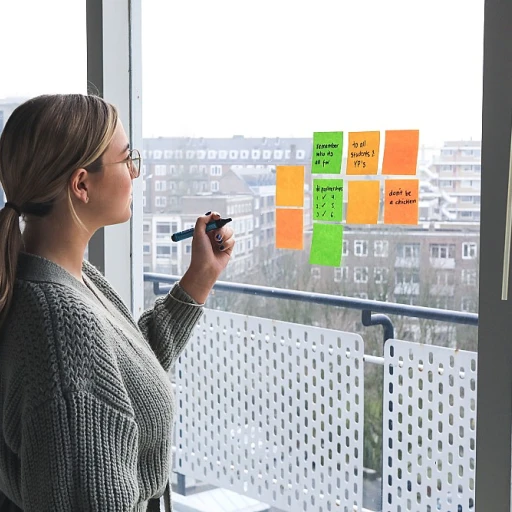
Understanding the Core Habits of Effective Leaders
The Essence of Leadership Habits
To truly understand the core habits of effective leaders, it's essential to recognize that these habits are a blend of intrinsic motivations and learned behaviors. Developing these habits requires commitment and a willingness to grow both personally and professionally. Leaders who thrive excel not only because they possess inherent leadership qualities but because they continually work on refining their habits. They adopt specific behaviors that create a positive impact in their school or workplace environments. These effective habits include being proactive, setting clear goals, prioritizing tasks, and nurturing their team's growth. Proactively addressing challenges is a hallmark of habitual effective leaders. A proactive habit helps individuals to take initiative and anticipate future challenges, allowing for innovative solutions that benefit the team. This responsiveness can inspire students to adapt similar approaches in diverse environments, from middle school to professional settings. The development of exceptional leadership habits doesn’t happen overnight. Continuous learning, often through leader programs, facilitates habit formation and reinforces them over time. A structured leadership development program can support leaders and students alike in mastering these essential life skills. Understanding and implementing effective habits can distinguish a person as a leader rather than just a manager. It's about nurturing environments where students can learn and grow, aligning with the mission statement of their institutions. Furthermore, these practices are not limited to a professional setting but can significantly enrich personal life. Credible leaders not only focus on developing these habits but also prioritize ethical conduct, enhancing trust within their organizations. The impact of ethical conduct on sustained organizational success is profound, building a reliable foundation for continued growth and achievement. Incorporating effective people-friendly habits can fill the gap between ordinary and exemplary leadership. Leaders must constantly seek to understand the needs and perspectives of their team members, embracing diverse ideas and demonstrating courage with consideration. This multifaceted approach ultimately contributes to a holistic leadership process where everyone involved—leaders, students, and staff—can win and learn together.The Role of Self-Awareness in Leadership
Embracing Self-Awareness as a Leadership Foundation
Self-awareness is a cornerstone of effective leadership. It involves understanding one's own emotions, strengths, weaknesses, and the impact these have on others. Leaders who cultivate this habit are better equipped to navigate the complexities of leadership, making informed decisions that benefit their teams and organizations.
Incorporating self-awareness into leadership development programs can significantly enhance a leader's ability to connect with their team. This process often begins in educational settings, where students learn to reflect on their actions and understand the broader implications of their behavior. Such habits, when nurtured from middle school through to professional environments, create leaders who are not only effective but also empathetic and considerate.
Building Self-Awareness: Practical Steps
- Regular Reflection: Spend time each day reflecting on your actions and decisions. This habit helps in identifying patterns and areas for improvement.
- Seek Feedback: Encourage open communication with peers and mentors. Constructive feedback is invaluable for personal growth and development.
- Mindfulness Practices: Engage in mindfulness activities that promote self-reflection and emotional regulation.
Stephen Covey, in his influential work on highly effective people, emphasizes the importance of self-awareness as a proactive habit. By understanding oneself, leaders can better understand others, fostering an environment where courage and consideration thrive.
Ultimately, self-awareness is not just a personal journey but a leadership imperative. It is a habit that, when consistently practiced, can transform leaders into role models who inspire and guide their teams towards success.
Building Resilience Through Consistent Practice
Strengthening Resilience in Leadership
Achieving effective leadership requires consistent practice, particularly in building resilience. This isn't just about personal strength, but rather about cultivating habits that enable adaptive and proactive responses to challenges. Schools and leadership programs often emphasize resilience, recognizing it as a foundational life skill essential for growth. For students to learn and internalize resilience, it's crucial to integrate these habits into their daily lives. Creating a school-wide environment that supports resilience-building can significantly impact students, helping them become future leaders. Consistent practice involves spending time on specific activities designed to strengthen these abilities, such as problem-solving exercises, which encourage highly effective habits. Moreover, the leader habits that highly effective people develop over time show the importance of consistency. Leaders understand the value of spending time honing their capabilities and nurturing a mindset that embraces change. In fact, one highly effective way to support this growth is through change management strategies, which can fill the gap between current practices and desired outcomes. By understanding that resilience is not a singular achievement but an ongoing process, leaders appreciate the need for continuous learning. Programs designed to teach resilience include aspects of proactive thinking, which enable leaders to address obstacles with a courageous and forward-thinking approach. This proactive habit turns challenges into valuable opportunities for growth. Thus, embracing the leader process involves more than just a mission statement; it calls for an active commitment to practice resilience daily, allowing habits to grow sustainably over time. For those interested in refining these skills, enhancing leadership with change management software can be an invaluable resource for streamlining efforts and maximizing personal growth.Fostering a Growth Mindset in Leadership
Embracing a Growth-Oriented Mindset
The journey of leadership is ever-evolving, and cultivating a growth-oriented mindset is essential to staying ahead in any leader's path. A leader who embraces growth does not merely settle for current skills or achievements; instead, they constantly seek to understand the needs of their team and themselves. This proactive habit allows leaders to creatively fill the gaps in their leadership capabilities and adapt to new challenges. In the realm of school environments, such as middle schools and broader leader school settings, instilling a growth mindset in students can have a transformative effect. When students learn that intelligence and talents can be developed over time, it opens up a world of possibilities. This not only promotes resilience but also encourages habits that contribute to the overall mission statement of preparing future leaders. Fostering a growth mindset doesn't happen overnight. This habit involves continuous learning and the courage consideration to step outside comfort zones. As students and leaders alike engage in programs designed to stretch their abilities, they develop life skills that are highly effective. By spending time learning new things, leaders can win by adapting to the ever-changing demands of the world around them. Highly effective leaders understand that setbacks are an integral part of the leader process. Rather than being deterred by challenges, they leverage these experiences to strengthen their resolve. Encouraging others within school wide programs to adopt this mindset helps create an environment where leaders and students staff are equipped with the skills to thrive. Leadership is not just about steering the ship; it is about constantly refining one's approach and learning from every experience. By prioritizing a growth-oriented mindset, leaders demonstrate their commitment to evolving along with their teams, ensuring leadership habits become an enriching part of daily life.The Impact of Communication Skills on Leadership
Communication: The Bridge to Effective Leadership
In the journey of leadership development, communication skills stand as a pivotal element that can make or break a leader's effectiveness. Whether you're a student in middle school or a seasoned professional, the ability to communicate clearly and empathetically is crucial. This habit is not just about speaking; it's about listening, understanding, and responding appropriately.
Effective leaders understand the importance of seeking to understand before being understood. This principle, popularized by Stephen Covey, emphasizes the need for leaders to listen actively and with empathy. By doing so, leaders can fill the gaps in understanding and build stronger connections with their teams.
Communication is a skill that can be honed over time through consistent practice. Programs and workshops often emphasize the development of this skill, encouraging participants to engage in exercises that enhance their ability to convey ideas clearly and listen actively. For students, especially in a school-wide setting, learning these habits can set the foundation for future leadership roles.
Moreover, communication is not just about words; it's about the courage to express ideas and the consideration of others' perspectives. This balance of courage and consideration is what makes communication a powerful tool in the leader's arsenal. It helps in building trust, fostering collaboration, and ultimately, leading a team towards a common mission statement.
Incorporating communication skills into daily life requires a proactive approach. Leaders should spend time reflecting on their interactions, seeking feedback from peers, and continuously learning from each experience. By doing so, they not only enhance their own skills but also inspire others to follow suit, creating a ripple effect of effective communication throughout their organization.
Integrating Leadership Habits into Daily Life
Embedding Leadership Habits into Everyday Routines
Developing leadership habits is not a one-time event but rather a journey that requires consistent effort and practice. Effective leaders understand the significance of embedding these habits into their daily lives. This practice enhances their ability to lead with purpose and make a positive impact on their surroundings. To truly integrate leadership habits, it is crucial to create a structured approach to personal development. Begin by identifying areas in your life where leadership skills can be applied. This could be at work, within a leader school, or even in managing personal relationships. Consider these steps to help weave leadership habits into daily routines:- Set Clear Goals: Determine your leadership goals based on your personal mission statement. This will provide clarity and guide your actions, reinforcing proactive habits and a strategic approach.
- Practice Self-Awareness: Regular self-reflection allows leaders to evaluate their strengths and identify areas for improvement. It aligns with the concept of seeking understanding before expressing ideas, which is a cornerstone of effective leadership.
- Build in Feedback Loops: Engaging with people who offer constructive feedback helps refine leadership skills. Encouraging this feedback creates a culture of growth and development among team members and students.
- Foster a Positive Mindset: Believing in the potential for growth inspires leaders to embrace challenges and persist through setbacks. This resilience can be cultivated through consistent effort and the adoption of a growth mindset.
- Prioritize Communication: Excellent communication is a habit highly effective leaders nurture over time. Engaging with team members and students with courage and consideration enhances trust and collaboration.
- Allocate Time for Learning: Dedicate time to learning new skills and knowledge. Whether through a structured program or self-directed learning, expanding knowledge enhances leadership capacity.













